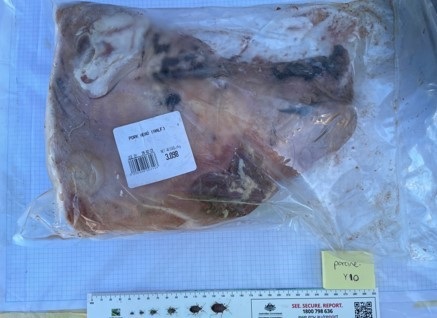
Half a pig’s head found vaccum packed in a siezed shipment of imported meat and plant products. Source – DAFF.
NEW South Wales farmers have called for increased biosecurity funding and greater collaboration between federal and state governments after the seizure of 38 tonnes of risky imported meat and plant material.
The Department of Agriculture, Fisheries and Forestry today said ‘Operation Avoca’ has secured more than 38 tonnes of biosecurity risk materials from a 250 tonnes shipment that included boxes of turtle meat, frog meat, plant products, avian meat, pig meat, beef meat, and raw prawns.
A DAFF biosecurity officer noticed suspicious boxes leaving a western Sydney warehouse during a routine inspection in New South Wales on 15 February 2023 that led to the department executing a warrant at a on 17 February 2023.
On 22 and 23 February, the Australian Federal Police assisted the department by executing multiple warrants at various locations in New South Wales connected to the warehouse. A number of warrants have been executed in relation to individuals and businesses in relation to the investigation.
At the western Sydney premises biosecurity officers diligently examined about 250 tonnes of goods and determined that more than 38 tonnes represented a biosecurity risk, including beef, chicken, duck, pig meat, geese, frog meat, raw prawns, plant products, and soil.
Goods were removed from the site in seven twenty-foot shipping containers and remain under Department of Agriculture, Fisheries and Forestry control.
The find prompted NSW Farmers to claim the commercial-scale meat smuggling operation could have ripped a COVID-sized hole in Australia’s economy.
Latest find likely “the tip of the iceberg” – NSW Farmers

NSW Farmers president Xavier Martin.
NSW Farmers president Xavier Martin said the 38 tonnes of turtle meat, frog meat, plant products, avian meat, pig meat, beef meat, and raw prawns seized by officials was likely “just the tip of the iceberg” and he called for more resources to defend Australia’s food production.
“The biosecurity officers who detected and seized these containers of material deserve to be praised for their efforts, but it does point to a major problem with our biosecurity system.
“The very fact that seven twenty-foot shipping containers filled with illegal products slipped through our system is a big cause for concern,” he said.
“Smugglers seem to be treating our border controls like a lucky dip, hoping they can get away with it, so if the government can find billions for nuclear submarines and Olympic Games they can surely find the money to build a stronger biosecurity system.”
Mr Martin said the government’s own numbers estimate the potential cost of an FMD outbreak would be about $80 billion.
“And it’s not the only biosecurity threat out there.
“Lumpy Skin Disease is also present in Indonesia, and we’re continuing to see efforts to eradicate Varroa mite impact beekeepers and the horticulture sector,” he said.
“Farmers have argued for stronger, long-term sustainably-funded biosecurity systems for years – it is absolutely critical the federal government lifts its spending in this space.”
Mr Martin said only a small portion of incoming freight was inspected by biosecurity officers and he was hopeful state and federal governments could work together with industry to improve preparedness and response.
“We have strongly advocated for the federal government to boost screening and put in place a long-term, sustainable funding model for biosecurity efforts, which is especially needed given the financial woes the department is facing.
“There is also the need for the federal government to work hand-in-hand with all states and territories, as well as other stakeholders, to ensure everyone knows exactly who needs to do what and when in response to a biosecurity threat.”
“These threats are very hard to get rid of once they arrive, and they are incredibly costly, so it is far better for us to spend a little on prevention now than a lot on the cure later.”
Smugglers face penalties and jail – Metcalfe
DAFF secretary and Australia’s director of biosecurity Andrew Metcalfe said anyone who intentionally tries to circumvent our biosecurity laws can face significant potential penalties of up to 10 years imprisonment and fines of up to $1,375,000 for an individual, or $6,875,000 for a company.
“The secured goods could have posed an unacceptable risk of introducing disease and pest for plants and animals alike.
“In addition, diseases and pests from imported goods would severely impact our economy, and we will work hard to protect our agriculture industries and natural environment from these threatening diseases,” Mr Metcalfe said.
“The department takes its role in managing and enforcing Australia’s biosecurity laws extremely seriously and the work of our biosecurity officers throughout this operation has been outstanding.”
The department said the investigation is ongoing and no further comment can be provided about the specifics of this case. It will continue to collaborate with the Australian Federal Police, Australian Border Force, and all other relevant parties throughout the next phase of the investigation.

They intentionally smuggle prohibited items. On TV shows, we see at Australian international airports every day of the week, incoming passengers caught with prohibited meats etc. and then let go with tiny fines. The exception was a guy caught with fast food; who was hit hard. If every inbound passenger was hit hard I would feel safer. Currently, there is little deterrent, hence the high numbers seen on TV caught.
Well done to the biosecurity team. I am personally horrified about this but it all relates to food availability, cultures and currency. I agree with you Mr Martin, if we can have subs and games let’s have more biosecurity on the ground in our oceans and the air space. How did this just slip in? Just not good enough.